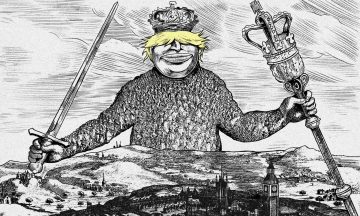 David Runciman in The Guardian:
David Runciman in The Guardian:
We keep hearing that this is a war. Is it really? What helps to give the current crisis its wartime feel is the apparent absence of normal political argument. The prime minister goes on TV to issue a sombre statement to the nation about the curtailment of our liberties and the leader of the opposition offers nothing but support. Parliament, insofar as it is able to operate at all, appears to be merely going through the motions. People are stuck at home, and their fights are limited to the domestic sphere. There is talk of a government of national unity. Politics-as-usual has gone missing.
But this is not the suspension of politics. It is the stripping away of one layer of political life to reveal something more raw underneath. In a democracy we tend to think of politics as a contest between different parties for our support. We focus on the who and the what of political life: who is after our votes, what they are offering us, who stands to benefit. We see elections as the way to settle these arguments. But the bigger questions in any democracy are always about the how: how will governments exercise the extraordinary powers we give them? And how will we respond when they do?
More here.
